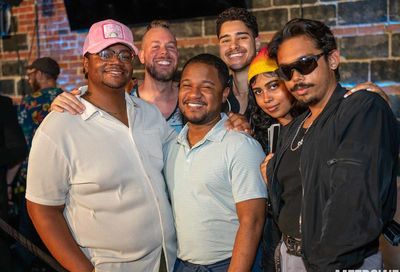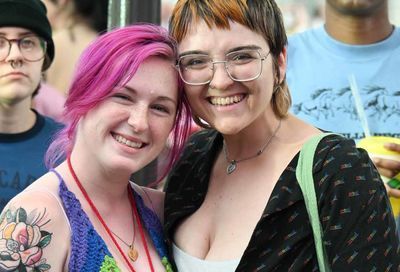Unboxing Bob Mould: A Metro Weekly Retrospective
We delved into our archives to celebrate the legendary musician, the impact of Blowoff, and the years he called D.C. home.

“Sounds like maybe it’s me or John Waters. Which is good company!”
In fact, Bob Mould has now overtaken the Baltimore legend when it comes to most appearances on the cover of Metro Weekly. With this week’s issue, Mould has now had that honor five times to Waters’ four over the course of the magazine’s 27-year history.
“It definitely upped my visibility in D.C., which I was very grateful for,” says Mould, who lived in the District between 2002 and 2009. “It just really meant a lot to me at the time. Like, ‘Wow, my local paper’s giving me some props for the stuff I’m doing.'”
That was true when it came to the prolific rocker’s solo work as well as for Blowoff, the music and party partnership with Rich Morel that was born in D.C. and grew into a national touring sensation. “I think Blowoff and Metro Weekly were pretty tied together for most of the time,” says Mould. “Especially from like ’05 all the way through the last one in January of ’14.”
Reminiscing about his life’s D.C. chapter had Mould feeling a bit wistful and nostalgic at several points during a recent phone conversation from his home in San Francisco. “My memories of the seven years I was in D.C. get fuller and richer as time goes on. What a crazy time to be in a crazy city like D.C. I mean, those were the W years — it was a pretty heavy time.”
Mould has been in something of a reflective and ruminative mood over the past year — partly due to the pandemic, which sidelined his touring career, but even more as a result of a 30-year retrospective of his music from U.K.-based Demon Records.
“As Mould’s musical trajectory enters its fifth decade, now is the perfect moment to reflect on the journey so far,” reads a label press release about Distortion: 1989-2019, a multi-part series heralded as “the definitive guide through the career of one of the most storied, creative, and consistent voices in the American underground.”
“In 1989, Bob Mould was already a renowned figure, thanks to his trailblazing work with Hüsker Dü,” writes British music critic Keith Cameron in the Distortion liner notes. “The Minneapolis trio…refracted ’60s pop melody through the discord of hardcore punk, creating a new language that The Pixies and Nirvana would subsequently teach the world to sing. With his debut solo album Workbook, however, [Mould issued] the first in an ongoing series of artistic transformations, each profoundly shaped by Mould’s sensitivity to his environment.”

The chief Distortion package, issued last October, is a massive 24-CD set with 295 tracks covering nearly all of Mould’s solo output to date, plus that from his former band Sugar as well as his electronica side projects LoudBomb and Blowoff. All told, it features 18 previously released studio albums, four live sets, two bonus discs of rarities and collaborations, and a 72-page booklet that includes lyric sheets, unseen memorabilia, and a foreword by actor and Portlandia co-creator Fred Armisen. Demon Records is also releasing, on a staggered schedule, four vinyl box sets covering the same ground. “It’s called Distortion because it describes the music and it fits the world we live in,” Mould says in the release. Engineers with Boston’s Peerless Mastering helped to make the audio consistent and balanced in quality, and German graphic artist Simon Marchner contributed new artwork that reimagines the original album covers.
Two of the four vinyl boxes are already out: Distortion: 1989-1995, an 8 LP set including Workbook and the two Sugar albums, along with assorted rarities and collaborations, plus lyrics and a tribute from Richard Thompson in the liner notes; and Distortion: 1996-2007, a 9 LP collection including 2006’s Blowoff as well an array of bonus tracks — chief among them the demo version of “Dog On Fire,” the instrumental theme song Mould wrote for Comedy Central’s The Daily Show — plus praise from Ben Gibbard of Death Cab for Cutie and The Postal Service and Bethany Cosentino of Best Coast.
Set for release April 16, Distortion: 2008-2019 boxes up the six solo albums released over that 11-year period, with bonus material including Mould’s collaborations with the Foo Fighters and Butch Walker, plus praise from Shirley Manson of Garbage. The reissue campaign will then draw to a close later in the year. “The fourth box is the live stuff. It’s pretty crazy the amount of stuff that’s come out,” Mould says, adding with a laugh about Demon Records, “they have really gone through the closet here.”
Asked if there are any plans for a digital component to the Distortion retrospective, Mould says “maybe in years to come it can all get reorganized under one roof,” explaining that “a lot of the digital rights are still held by different labels in certain territories.” Also missing from the retrospective: Blue Hearts, the timely and angsty studio album recorded a month before the pandemic struck, but well after Distortion was already in final production. Released last September by Merge Records, the album will instead mark a new chapter in Mould’s career, if not serve as a kickoff to a second full career arc. “Probably not, but I’ll try,” the 60-year-old Mould says about rocking for another 30 years. For one thing, the new chapter hasn’t exactly gotten off to the most auspicious start. “I wish I could say the pandemic was conducive to writing new material, but that hasn’t been the case so far,” he says.
The mental and emotional work involved in reviewing his life and career to put together Distortion was essentially painless, Mould says, given that he had already done most of the heavy lifting in that regard with his 2011 autobiography See A Little Light.
“That was a really heavy experience for me because that was a lot of personal stories that I hadn’t shared or I hadn’t reconciled in my own mind,” he says. “The one thing that got illuminated this time around was strictly the music and the geography of cities and places [that influenced it]. We tried to tell this story of time and place, and how all of these places that I’ve lived informed the work that I was making at the time.”
Notably, few places have had the kind of impact on the man and his music as D.C. — particularly when it came to Blowoff. “I try to tell these stories to people who know my rock music side, and I’m not sure they really understand it,” he says of his straight fans and colleagues. “It’s hard to convince them how important that was to me. Because they see it from a different place, right? I’m like, ‘No, no, no, you don’t understand. This was 24/7: This DJ thing was not a hobby.’ Blowoff was a really important part of my life that I miss and that I always think fondly about, and that period of time. The community coming together to listen to a couple of oddballs play what we thought was good music. I mean that was sort of a leap, you know? And it worked out.”
It would be hard to overstate just how well Blowoff worked out, or to overstate how tied up it got with Mould’s gay identity as well as his connection to D.C. — which was otherwise tentative at best. In early 2002, Mould and his partner at the time sold their New York apartment while he was touring his Modulate album. Looking for somewhere to live, they ultimately “ended up in D.C.”
“Rich [Morel] was one of the few folks that I knew in D.C. Leaving my New York life behind, I watched as, within a year, my relationship dissolved, ending up single, and looking for a new group of friends and a new community. And D.C. was great,” Mould says. “I was living on 15th and U northwest — it was a different neighborhood then than it is now…. It definitely was not the bustling gay neighborhood it became very quickly. Just to be there to watch, in terms of the gay community, that transition from Dupont to Logan to eventually up to Nellie’s and Town, and Blowoff at 9:30 — those years were just really, really, really, really special for me. And Metro Weekly was such a big part of that…. It’s a really incredible community, and so politically active. I mean that was really, really great times.”

Mould feels for those who “didn’t get to experience the buzz of being in a gay neighborhood and just really taking ownership of community. All of us feeling like we really belonged, and everybody had a place, and everybody contributed.” And everybody connected, in part, by reading LGBTQ publications.
“Metro Weekly was like that for D.C. when I arrived,” Mould says. “I was like, ‘Wow, here it is. These are pictures of me and my friends, and other people I haven’t met yet, and other parts of the community that I maybe wasn’t aware of — whether it’s the drag community or the two-step community at Remington’s.’ Just really learning about the other parts of the community and that sense of belonging. It was just a physical act, much like going to record stores where you’re watching other people and what they’re browsing. You’d watch your friends, everybody, rushing to grab the weekly paper. And businesses that would sponsor the papers and take out ads and to help out — it was just such a strong sense of community and belonging.
“As time has gone on, digital media has reshaped how people breathe, basically,” Mould continues with a chuckle. “It’s great that we still have digital outposts that we can sort of rally around and be part of a community — albeit in a different way, and clearly in a way that’s being monitored by everyone. It feels different.”
Ultimately, Mould worries we’re losing our sense of community: “We’re watching the last pieces of our old community disappear, not only because of digital media, but also because of the pandemic. So it’s been a really tough year,” he says.
“Back in February and March of last year, I don’t think any of us fully understood how the pandemic was going to play out. As the year went on, it became pretty clear that there wasn’t going to be touring — [it] definitely affected my ability to make a living — but it didn’t change the trajectory or…affect the release schedules.”
While optimistic that touring and performing will resume in the not-too-distant future, Mould isn’t holding his breath. “I’m hopeful that the worst is behind us on this pandemic,” he says. “The complication, for all of us who are working musicians who tour the country and other continents, is local restrictions and local variances. Touring from state to state, day after day, there’s no guarantee of consistency because states take these matters into their own hands. And we have these rolling coronavirus hotspots right now, and I don’t know if that’s going to change, even with higher rates of vaccination and immunity. I wish I felt better about all that.”
He notes the logistics of “putting a group of people together and traveling from state to state” with no guarantees that everything will go to plan. “It’s not quite as easy as it might seem.”
Also not as easy as it seems: performing virtually through a livestream.
“I thought about it for a little bit. I was watching what other people were doing,” he says. “I don’t think it’s for me because of how I view music and how I view my role in music: as a sort of traveling storyteller who tries to gather people in a room and create community. We have all this amazing technology, but I don’t think any of it replaces the experience of being pushed right up next to somebody, and you’re singing these songs together. And there’s this humidity and this sort of jostling, and really that is all part of the experience of how I tell stories, whether it’s performing with an acoustic guitar or whether it’s playing with a band or whether it’s DJ-ing in a club.
“All of that is about creating an experience that contributes to the work itself and the understanding of the work. And I don’t know if a static camera set up in the basement really gets that across. I’ve seen other people who have done great things with it. A lot of people approached me with ideas, and none of it really seemed right. I think I’d rather wait until I can get people back together in the way that we’re used to.
“I mean it’s been much rougher for everybody around me, but personally, I’m the last guy to go back to work. The guy with the loudest voice. The guy who stands on stage and sprays aerosols out of his mouth for 90 minutes. I can’t wait.”
To honor Bob Mould’s Distortion box set, we dug through our own archives. In this week’s issue, you’ll find the four main Bob Mould cover interviews, starting with his 1992 debut in our pages, as well as one conducted by folk-pop artist Tom Goss in 2009. We wrap with our Bob Mould-Rich Morel sit-down in 2013, as Blowoff drew to a close. For fun, we threw in a Hearsay mention and a piece that appeared in the 2005 Pride Guide, before Mould made his first-ever appearance at an LGBTQ Pride Festival. Reviews of Mould’s albums over the years, as well as other articles, can be found here.
To read the full interviews, check out the issue below:
Read More:
Brandy Clark, out and proud country star, celebrates her most personal record yet
Russell T Davies drew on his own life experience for “It’s a Sin”
Alexandra Billings brings trans representation to primetime on ABC’s “The Conners”
Support Metro Weekly’s Journalism
These are challenging times for news organizations. And yet it’s crucial we stay active and provide vital resources and information to both our local readers and the world. So won’t you please take a moment and consider supporting Metro Weekly with a membership? For as little as $5 a month, you can help ensure Metro Weekly magazine and MetroWeekly.com remain free, viable resources as we provide the best, most diverse, culturally-resonant LGBTQ coverage in both the D.C. region and around the world. Memberships come with exclusive perks and discounts, your own personal digital delivery of each week’s magazine (and an archive), access to our Member's Lounge when it launches this fall, and exclusive members-only items like Metro Weekly Membership Mugs and Tote Bags! Check out all our membership levels here and please join us today!




























You must be logged in to post a comment.